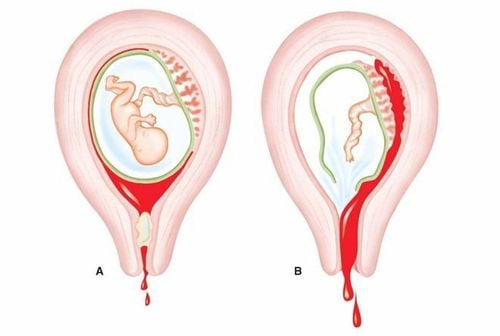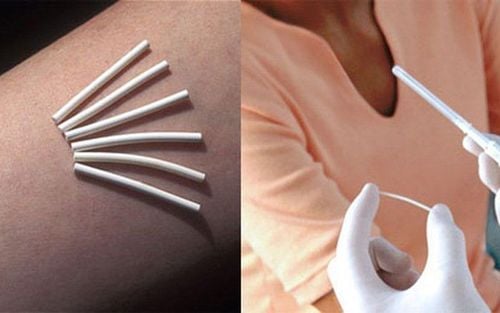This is an automatically translated article.
The article was consulted with Specialist Doctor I To Kim Sang - Internal Oncologist - Oncology Center - Vinmec Central Park International General Hospital.Thinprep test (full name is Thinprep Pap) is a new step in medicine, thanks to this test, millions of women have escaped the "death sentence" of uterine cancer. So how often should the Thinprep test for cervical cancer be done?
1. What is the Thinprep test?
The Thinprep test is the process of taking samples from the cervix and placing them in a fixative liquid in a Thinprep vial. Then transferred to the laboratory for processing by the Thinprep machine as an automatic specimen. Do not follow the usual way of smearing cervical cells on a slide to make a normal slide.Thinprep with advanced microprocessor and evenly rotating filter creates even and gentle dispersion. Destruction of blood cells, mucus and debris is not diagnostic. Then thoroughly mix the test samples to have standard slides, the cells will spread evenly on the plate and help the pathologist to analyze the results accurately, limiting the miss of lesions.

Tóm tắt quy trình xét nghiệm Thinprep
2. What is the Thinprep test used for?
The Thinprep test is used to evaluate the cervical-vaginal cell sample. To detect precancerous, cancerous and cervicitis changes. The organs (sites) to be evaluated include cells in the cervix, inside the uterus, outside of the uterus, in the vagina and vulva.Thinprep test is capable of early detection of abnormalities in cervical cells of various degrees. Specifically, it can help detect:
epithelial cell lesions such as: unspecified atypical squamous cells (ASC-US) or atypical squamous cells that do not exclude high grade lesions (ASCs) -H). Detection of atypical glandular cells of undetermined significance. Identify low-grade squamous epithelial lesions. Identify lesions caused by HPV virus. Diagnosis of mild dysplasia. Mild dysplasia caused by HPV virus. High grade squamous cell dysplasia Moderate/severe dysplasia. Diagnosis of endometrial carcinoma/carcinoma in situ. Positive for squamous cell carcinoma. Cervical/uterine adenocarcinoma positive.
3. How often should the Thinprep test for cervical cancer be done?
Before showing obvious symptoms of cervical cancer, this dangerous disease often has a long incubation period. Therefore, you should regularly perform the Thinprep test at regular intervals under the direction of your doctor.Thinprep testing should be done when:
3 years after first sexual intercourse, or starting at age 21. Thinprep testing should be done once a year between the ages of 21 and 30. Ages 30 and up. up: If all 3 previous test results were negative, Thinprep should be tested every 2-3 years; If both HPV and Thinprep tests are negative, have a Thinprep test every 3 years. Women who are immunosuppressed, HIV-positive or who regularly use synthetic hormone DES (a form of Estrogen) that can cause uterine cancer should have the Thinprep test regularly. Women who have had a hysterectomy or are menopausal women who previously tested negative for the Thinprep test may not need to continue this test.

Thường xuyên thực hiện xét nghiệm Thinprep theo định kỳ dưới dự chỉ định của bác sĩ
4. Special notes when performing Thinprep Pap . test
The Thinprep test should not be performed during your period. The best time is on the 10th - 14th day of the menstrual cycle.Do not test Thinprep after 1-2 days of sex.
Lubricants, blood and vaginal medications will interfere with the collection of cervical cells. It also affects the quality of cell samples tested.
False-negative or false-positive test results are both possible with Thinprep Pap tests. A positive test result should be reconfirmed with other clinical and laboratory test results.
Every year there are about 5000 cases of cervical cancer among Vietnamese women, 2000 deaths, over 90% of these cases are related to HPV. Therefore, the Thinprep test has been used for the early diagnosis of pre- and cervical cancer in women. Women of reproductive age should take the time to conduct the Thinprep test as indicated to protect their reproductive health.
The package of screening and early detection of gynecological cancer at Vinmec International General Hospital is designed for the following customers:
Female customers with abnormal symptoms such as: Abnormal vaginal bleeding; Menstrual problems; Abnormal vaginal discharge (with a bad odor, a different color than usual); Vaginal pain, itching.... Female clients have several risk factors such as poor personal hygiene, unsafe sex, abortion,... Female clients have symptoms of infection other. Gynecological cancer screening and early detection package helps customers check gynecological function. Carry out necessary tests to help detect early diseases: cervical - uterine - ovarian cancer even when there are no symptoms.
Please dial HOTLINE for more information or register for an appointment HERE. Download MyVinmec app to make appointments faster and to manage your bookings easily.













